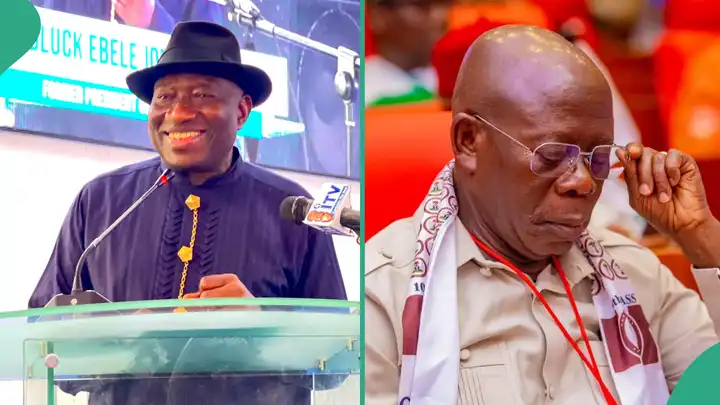Political Showdown: The APC Crisis and the Fallout of Oshiomhole’s Supreme Court Sacking

Political Showdown: The APC Crisis and the Fallout of Oshiomhole’s Supreme Court Sacking
In the latest twist of Nigeria’s volatile political landscape, the Supreme Court’s decision to sack Adams Oshiomhole as National Chairman of the All Progressives Congress (APC) has ignited a fierce debate. The ruling, which many see as a blow to Oshiomhole’s political career, has drawn reactions from across the political spectrum, including former President Goodluck Jonathan, who has voiced his discontent with the verdict. This article delves into the intricacies of the crisis engulfing the APC, examining the factors leading to Oshiomhole’s removal, its aftermath, and what this means for the party’s future.
The decision by the Supreme Court to uphold Oshiomhole’s removal as APC chairman was met with mixed reactions. Supporters of Oshiomhole saw the ruling as unjust and politically motivated, while others viewed it as a necessary step to resolve internal conflicts within the party. Jonathan’s criticism of the ruling reflects a deeper division not only within the APC but also across the political spectrum. By questioning the integrity of the judgment, Jonathan ignited a conversation about the influence of politics on Nigeria’s judiciary system.
Adams Oshiomhole, a former labor leader and governor of Edo State, once stood as one of the APC’s most prominent figures. His leadership of the party was characterized by his brash, confrontational style, which earned him both staunch allies and powerful enemies. The court rulings that led to his eventual ouster were the culmination of internal party conflicts, including high-profile disagreements with influential governors. This section explores Oshiomhole’s political journey, his achievements, and the controversies that led to his downfall.
The removal of Oshiomhole has thrown the APC into disarray, revealing deep-seated tensions within the party. Factions loyal to Oshiomhole have continued to challenge the legitimacy of the Supreme Court’s ruling, while other members, including some governors, have pushed for new leadership. This section will delve into the internal power struggles that have plagued the APC since Oshiomhole’s ouster, including the battle between national leaders like Bola Tinubu and key state governors for control of the party’s future direction.
Former President Goodluck Jonathan’s criticism of the Supreme Court’s ruling added fuel to an already tense situation. His comments suggest a broader dissatisfaction with the current state of Nigerian politics, where judicial decisions are increasingly seen as influenced by political allegiances. This section analyzes Jonathan’s remarks and examines how his intervention could influence future political alignments, both within the APC and in the opposition parties.
The crisis surrounding Oshiomhole’s removal raises significant questions about the future of the APC. With the 2023 general elections approaching, the party must navigate its internal divisions if it hopes to retain power at the national level. This section explores potential scenarios for the APC’s future, including the possibility of reconciliation within the party or a deeper fragmentation that could weaken its chances in upcoming elections.
The Supreme Court’s decision to sack Adams Oshiomhole has left the APC at a crossroads. As the party grapples with internal divisions, the fallout from this ruling could have far-reaching consequences for Nigeria’s political landscape. With voices like Jonathan’s questioning the legitimacy of the verdict, the stage is set for a prolonged political battle that could reshape the future of the APC and Nigerian politics as a whole.
By structuring the article in this manner, you provide readers with a comprehensive understanding of the political dynamics at play, while also keeping them engaged with hooks and detailed analysis at every stage. This approach ensures that the content is compelling and informative.
Do you find Tmaq Media useful? Click here to give us five stars rating!
























